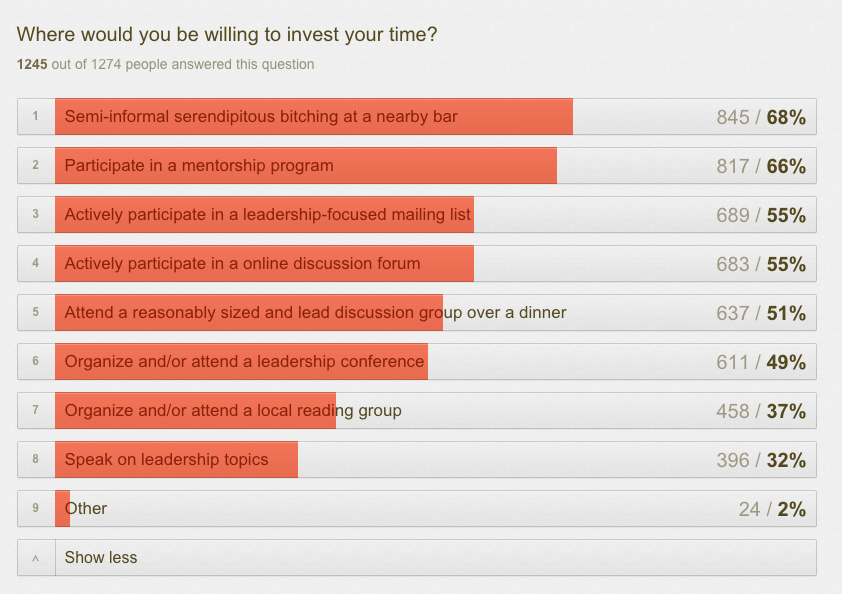Links
Semi-informal Serendipitous Bitching
The final count of respondents to the Rands Leadership Survey was 1274. Thank you to everyone who took the time to fill out the survey. I’ve called in volunteers to help scrub and normalize the survey data and will have a detailed report published here. It will also be sent to the inboxes of those who requested a copy.
Here’s the breakdown of answers to the question: “Where would you be willing to invest your time?”
Four of the top five answers involve us getting together in some fashion and discussing the craft and/or bitching. This resonates, so in what might be a horrible mistake, I’ve created a public Slack channel where we can do just that thing. I was originally thinking a mailing list would be the move here, but email is a blight and you don’t need more email.
This Slack channel is a low risk and low commitment experiment and is not the only consequence of this survey – simply the first. If you’d like to productively join the conversation, please send your email address to michael@lopp.com and we’ll get you in an invite as quickly as possible.
Leeroy Jenkins, 10 Years Later
RIP Gotham – Still In Progress
Roughly a year and a half ago, I wrote a post about my ongoing rage regarding the removal of the Gotham filter from Instagram. I’ve calmed down a lot since then and I’m still manually constructing my own version of Gotham:
More importantly, the #ripgotham hashtag is alive and well in Instagram and perusing the work there remains one of my Instagram pastimes.
Everything That Mattered
https://www.youtube.com/watch?v=kYJgCp_9h48
Wait for the “Whooooa” at 1:21
Simple Rules for Hard Decisions
The authors identify two types of simple rules: Those that can help you make decisions and those that can help you do things.
Decision rules set boundaries, prioritize alternatives, and establish stopping points. The disastrous ascent of Mount Everest that resulted in eight deaths in 1996, chronicled in Jon Krakauer’s best-selling book Into Thin Air, was precipitated by the violation of a single rule that had been set by Scott Fischer, an expedition leader: “If you aren’t on the top by 2:00, it’s time to turn around.” (Any later and the risks were exponentially greater because the exhausted climbers would have to make the descent to their camp in the dark.) After unexpected delays, Fischer and most of the party ignored the rule and kept climbing. Fischer himself didn’t summit until 3:45 p.m. Unfortunately, his body is still on the mountain.
(From Theodore Kinni on Quartz)
Introverts as Leaders (Briefly)
Introverts have two unique strengths that, I believe, can lead towards opportunities to be stronger leaders:
-
Introverts are professional listeners. Their natural state is to observe and gather data from the world around them as opposed to their extroverts counterparts who enjoying spending their time talking about the state of the world and all the fascinating data in the world… endlessly. This listening skill is amplified by the fact that introverts don’t much want to talk about themselves, so out of necessity they’ve developed a good conversation toolkit to get others to talk about themselves thus lessening their talking burden.
-
All of this listening results in the acquisition of data and all of this data results in better situational awareness. This awareness of what is going on in the immediate vicinity is amplified by the introverts deep desire to avoid interpersonal conflict. They have developed a strong early warning system around conflict amongst humans which means introverts are often aware of developing conflict well ahead of the actual conflict.
Both strengths result in a better picture of the social state amongst a group of humans. The trick for the introvert as leader is the proactive usage of that information. These strengths have been developed over years as a necessity to avoid human interaction, but in order to lead, we must ignore our instincts to run and hide from emerging conflict and rather use our well developed listening skills to not only understand what is developing, but how we’re going to lead through that distinctly uncomfortable situation.
Confidence is a feeling
It’s a state of mind. It’s the perception that you lack nothing. That you are equipped with everything you need, both now and for the future. A person confident in their social life will feel as though they lack nothing in their social life. A person with no confidence in their social life believes that they lack the prerequisite coolness to be invited to everyone’s pizza party. It’s this perception of lacking something that drives their needy, clingy, and/or bitchy behavior.
(Via Mark Manson)
Hockey Sounds
(Via Coudal who roots for those damn Blackhawks.)

